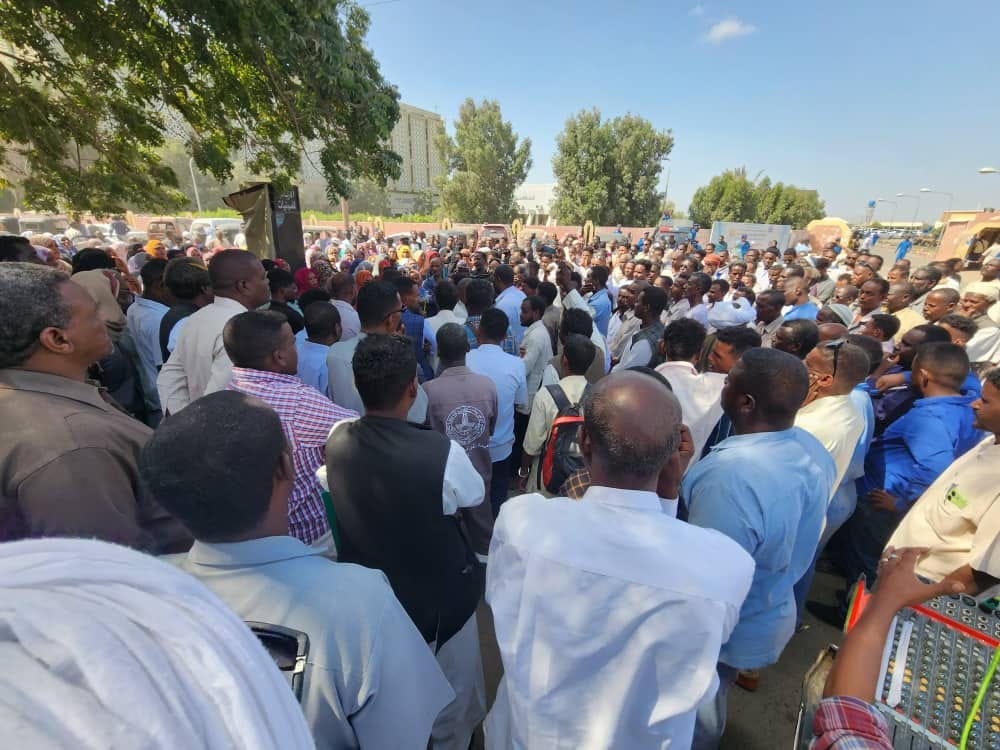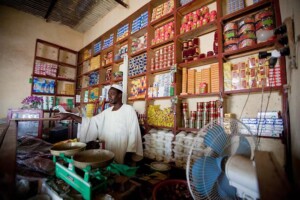Port workers threaten with strike over Sudan Finance Ministry’s ‘interference’

Employees of Sudan’s Sea Ports Corporation attend a protest against decisions by the Ministry of Finance (File photo: Supplied)
Employees of the Sea Ports Corporation (SPC) in Port Sudan, Red Sea state, are protesting the decision of the Sudanese Ministry of Finance to place the corporation’s departments under its control. According to Finance Minister Jibril Ibrahim, the decision “is based on the fact that the corporation is a state institution owned by the Sudanese people”.
Angry staff members of the SPC* on Sunday organised a vigil in front of the corporation’s headquarters in protest against the transfer of the Human Resources, Legal Affairs, Accounting and Auditing departments from the corporation’s management to the Federal Administration.
The protesters called for “the enactment of a law for the Sea Ports Corporation that preserves its independence”.
The decision, issued by the Service Affairs Bureau on Tuesday last week, stipulates the filling of positions at the departments by government units. Each unit should be linked to federal departments at the Ministry of Justice, the Service Affairs Bureau, the Accounting and Finance Bureau, and the General Audit Office. The Service Affairs Bureau advised the employees of the concerned departments either to subordinate themselves to the federal administration or to move to other departments within the ports corporation.
In his speech during the vigil, labour leader Osman Taher called the decision to transfer the corporation’s departments to federal administrations “a blatant interference from the Finance Minister Jibril Ibrahim”.
He warned for “violent options” in the event the police would try to prevent them to stage protests. He demanded the Service Affairs Bureau, the Ministry of Labour, and the Ministry of Finance to evacuate their offices in the ports “or else they will be removed by force if they insist on the decision, and all ports will be closed”.
Bitter
In a small survey conducted by Radio Dabanga among the employees, most of them said they consider the decision “an attempt of the federal Ministry of Finance to encroach on the competences of the ports corporation management”.
The concerned departments have always been dealt with by the corporation’s management, they stressed, and threatened to embark on a strike if the ministry insists on the implementation of its decision.
“The move is an attempt to empty the concerned departments of the Sea Ports Corporation of its current staff, and fill them by employees from the federal departments,” Osman Sanaa, labour leader in the ports, told Radio Dabanga.
“This is really bitter, especially as we lost our jobs due to the war,” he said. “The decision has not only sparked great anger among employees and workers in the ports, but also the entire Red Sea state community. We all consider it as an attempt to control the resources of the state.”
The Service Affairs Bureau directed the auditor general “to close the accounts of any unit that does not comply with this decision and suspend any privileges contained in the laws and regulations of the civil service”.
Red line
Labour leader Ali Mousa pointed to “the fear the workers and the port community had about the privatisation of the ports, which was halted by the federal government after years of protests” and said that the decision is an “an attempt to employ certain groups of people in the ports corporation”.
He stressed that the corporation has its laws and regulations. “All departments fall under the director general. If we’d agree with the decision, this means transferring them to an authority that has nothing to do with the ports work.”
Protester Mohamedein Mousa told Radio Dabanga that “any attempt to replace staff under the guise of the law destabilises the [Red Sea] state and the ports are a red line”.
The Red Sea ports “are financing all ministries that came from Khartoum and settled in Red Sea state because of the war,” he said.
The Dabanga team has contacted the Ministry of Finance and the Bureau of Service Affairs for a clarification of the decision and its reaction to the workers’ accusations, but did not receive a response.
Legal right
Jibril Ibrahim, Minister of Finance and Economic Planning, and former leader of the Darfur Justice and Equality Movement, said at a press conference in Port Sudan yesterday that the decision he issued with regard to the Sudan Ports Corporation “is based on the fact that the corporation is a state institution owned by the Sudanese people. It was taken within the framework of the Ministry of Finance’s mandate over public funds.”
On January 25 last year, the Council of Ministers chaired by acting Minister of Cabinet Affairs Osman Hussein approved a draft law on amendments to the mandate of the Ministry of Finance concerning its jurisdiction over public funds. The law affirms the ministry’s jurisdiction over public money by making the necessary amendments to laws that conflict with these rights.
Ibrahim said that “the amendments law, approved by the Sovereignty Council and the Council of Ministers, grants the Finance Ministry the authority to decide over public money, which means that the intervention of the Minister of Finance in the affairs of the Sea Ports Corporation is a guaranteed legal right and cannot not considered an intrusion into port affairs.
“According to the law, seaports are no different from other federal institutions such as airports and railways,” he stated.
Benefits
“Those living in Red Sea state benefit from the ports in terms of employment and social responsibility,” he said, responding to accusations that the federal government has marginalised the region. “The government is focusing on more public projects such as the provision of drinking water and electricity, and the improvement of the infrastructure in the state. It plans to restore the Tokar agricultural project, complete the Tokar Road, and establish a power station in Osif.”
The finance minister claimed that the people in Red Sea state are now also benefiting from the transfer of ministries to Port Sudan after the outbreak of the war between the Sudanese army and the Rapid Support Forces (RSF) in April last year.
“House rents for instance rose from $500 to $10,000. Furthermore, the internal transport sector and rickshaws also profited from the arrival of the federal government.”
Customs Dollar rate
Ibrahim denied imposing a 30 per cent increase of the US Dollar rate for customs processing in January, noting that “the government decided in June 2021, after the unification of the dollar exchange rates, that exchange rates are determined by the Central Bank of Sudan”. According to him, “the customs authority suffers from a problem in keeping up with its work”.
On the ministry’s decision to reduce the period of allowing goods to remain in the ports for not more than 45 days instead of three months, he said that “this was done to prevent overcrowding of ports and the accumulation of goods in the warehouses, which earlier led to fire in the Suakin port”.
Commercial activities at the Red Sea ports are dwindling because of the ongoing war in the country. Port traffic has declined by up to 40 per cent since the outbreak of the armed conflict more than 300 days ago. The situation worsened when the Houthi rebels in Yemen began to attack ships in the Bab El Mandeb strait, causing port workers to expect a ‘complete shipping paralysis’.
Last week, livestock exporters panned the finance ministry and the customs authorities for imposing extra customs duties. Economists say that this decision will lead to a further decline in the country’s foreign currency revenues.
* The Sea Ports Corporation is an independent state corporation of Sudan that governs, constructs, and maintains the ports, harbours, and lighthouses on the Red Sea coast. The company was founded in 1974 by the Sudanese government to be the national port operator and port authority.











 and then
and then